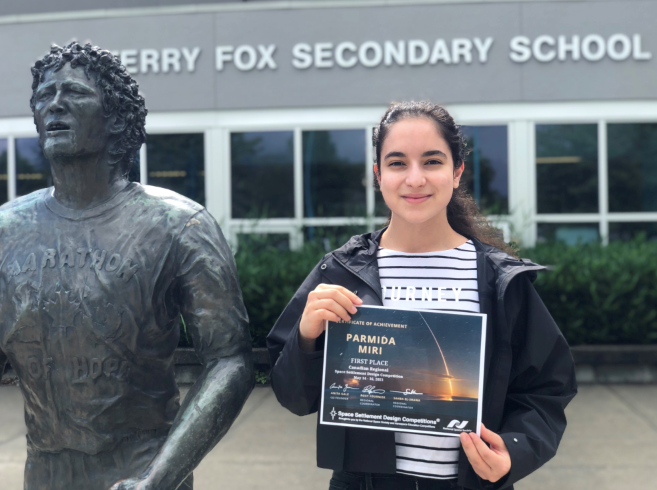With NASA planning to establish a settlement on the moon, don’t be surprised if a Port Coquitlam student ends up being one of its first residents.
Parmida Miri, a Terry Fox Secondary grade 11 student, hopes to walk on the moon one day and there’s a good chance she might given her skills and abilities in (STEM) science, technology, engineering and math.
Recently, Miri learned she was chosen among Canadian finalists in the National Space Society competition to compete in the international finals taking place at NASA’s Kennedy Space Center in Florida July 30 to Aug. 2.
Barring COVID-19 travel restrictions, Miri might be able to attend the conference in person to mingle with other like-minded students interested in developing systems for life in space.
“I want to go to NASA,” said Miri, “They have to reserve a space for us.”
However, even if she has to participate virtually — as she did for the national competition — Miri is excited to use her creativity and skills to work on space-related projects.
TERRY FOX STUDENT 'LOVES' THE IDEA OF SPACE
The recent immigrant from Iran is only 16 years old, but she’s already completed a higher level Grade 12 physics class with 99%, according to her teacher Edward Csuka, and she’s been studying astrophysics and quantum mechanics.
Miri says she loves the idea of space and hopes to work on a space-related project one day.
She hopes to study astrophysics and artificial intelligence in the future, with a goal to study at MIT.
Space is the final frontier for the teen who already moved thousands of miles from her home country, where she first thought about space and how the earth fit into the big picture.
“It was like from the first time I looked at the sky, [I thought] the world is really wide, and all the stars are shining, I’m really curious about everything.”
DESIGNING A SPACE SETTLEMENT
With her interests and abilities, Miri was a natural fit to participate in the National Space Society settlement design competition. Working with a team on weekends, Miri designed robots for constructing a settlement as well as a network for technology systems.
“It was really like creating the whole space settlement, and being like real engineers, and working with a lot of people in different areas and different groups.”
She said the settlement her team designed had elements of the future, such as hologram watches, and fun games, including zero gravity frisbee.
Now, with the NASA competition on her radar, Miri is looking forward to more competition and meeting others with similar interests. But if the competition is online, she’s not too concerned.
“It would be really great if I could, but if not, I wouldn’t be disappointed, there are many opportunities coming in the future.”




